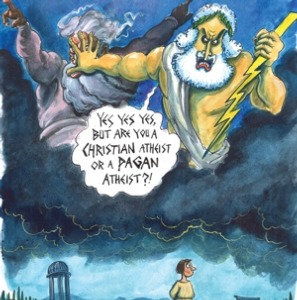Groups from Europe, North America, North Africa and the Middle East gathered in Geneva in early April to set up an alliance called 'Women's International Federation Against Fundamentalisms and for Equality'. Their aim: to fight the religious oppression of women worldwide. That a group had to be founded specifically to deal with the oppression of women is telling: no other section of society is still so systematically subjected to discrimination and persecution in East and West.
In Afghanistan, two years after the removal from power of the misogynistic Taliban, women are still kept out of public life by warlords supported and funded by the USled coalition forces. According to Human Rights Watch, some local governors are continuing the Taliban practice of forcing women found in the presence of unrelated men to undergo medical exams to determine whether they have had recent sexual intercourse, or if they are unmarried, whether they are virgins.
In Saudi Arabia, the recent fate of a wellknown TV presenter highlighted the plight of women abused by their husbands. Rania alBaz gave permission for newspapers to publish pictures of her battered and bruised face, in order to raise awareness of domestic violence in a country where it is considered a husband's rights that his wife should obey him. Sharia law is strictly enforced, and women are forbidden to drive, own a business or travel without permission from a male guardian.
In Iraq, Yanar Mohammed, chairperson of the Organization of Women's Freedom in Iraq, has received death threats from fundamentalist Islamic groups. Opposing the Islamisation of Iraq, OWFI recently proclaimed: "The Governing Council, installed by the USA, absolutely does not represent the Iraqi masses. We demand a secular constitution that treats all Iraqis equally. Our protests in Baghdad and all over the world will deny the [fundamentalist] Islamic groups any chance to impose their medieval laws on the masses of Iraq. We call on all defenders of gender equality and women's freedom to add their voices to the voices of women in Iraq."
In the United States the Christian Right is trying to make abortion a central issue in the coming presidential elections. George W Bush has already signed into law an act that makes harming a foetus a federal offence, and women's rights campaigners say it is only a matter of time before this law effectively criminalises abortion.
Just how bad the situation of women is, was dramatically highlighted in a recent Amnesty International report: "Violence against women is the greatest human rights scandal of our times. At least one out of every three women has been beaten, coerced into sex or abused in her lifetime."
But there is hope, despite the grim news. Women such as alBaz are speaking out against institutionalised abuse, lifting the veil of silence concealing it.
As Jodie Reed reports in this issue (p28), women activists within Britain's immigrant communities are campaigning against the horrific practice of female genital mutilation. As a result, stricter laws have been introduced in Britain to stop this procedure from being carried out whether here or abroad. By educating community elders about the medical dangers, and supporting campaigners who have themselves been subjected to this horrendous procedure, it will hopefully be possible to prevent it from taking place at all anymore.
Meanwhile, the Women's Lib movement of the 1960s and 70s in this country is bearing late fruit: according to Jenni Murray (p8), a new men's movement is demanding equal rights for fathers wanting to take on childrearing tasks previously left solely to mothers. With any luck, this will lead to greater gender equality not just in law, but in everyday life as well. In the longterm, changing the way people think is far more effective than changing the law.
In a recent column the president of the Arab Women's Solidarity Association, Nawal ElSaadawi, blamed the twin fundamentalisms of religion and capitalism for the ongoing subjugation of women: "Women are besieged by a double pincer assault that of corporate consumerism and the free market on the one hand, and religious political fundamentalism on the other. Ostensibly at odds, they actually combine to maintain the subjugation of women, to control their minds and their bodies by patriarchal imprisonment, veiling and domestication."
Such oppression should be anathema to humanists everywhere. What good are promises of half the heavens, if half the earth is hell?

